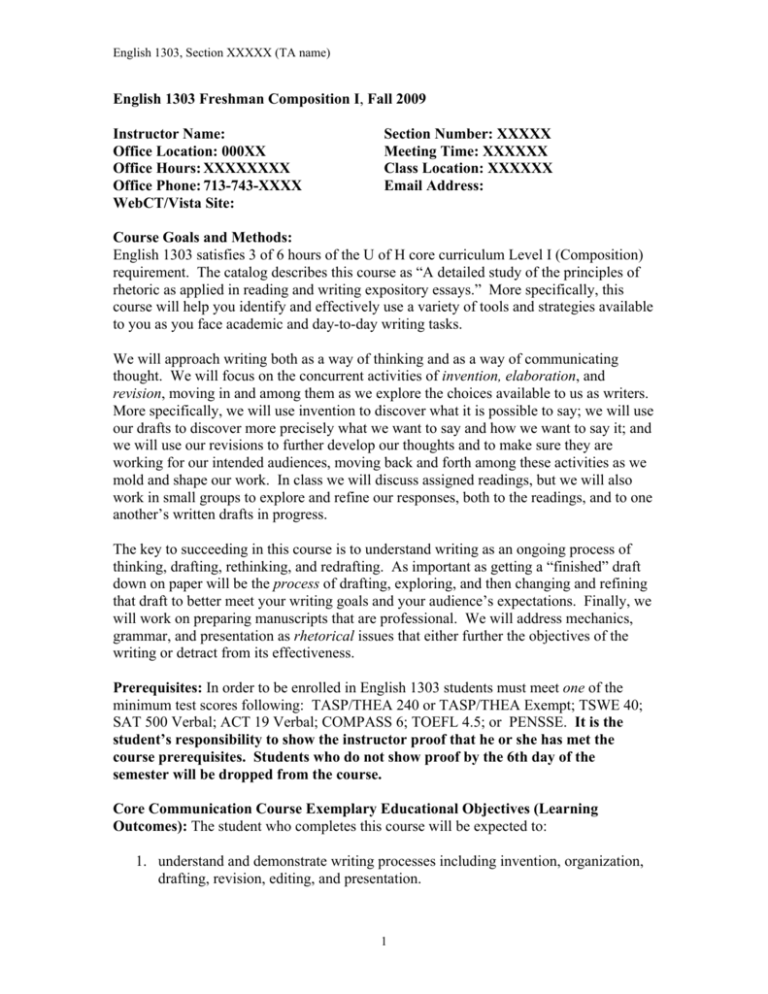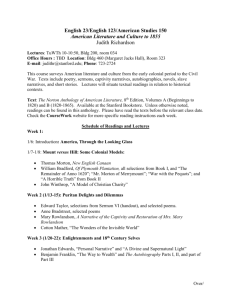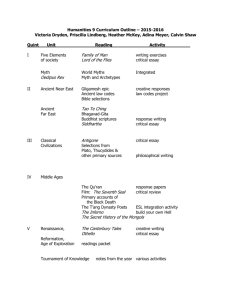
English 1303, Section XXXXX (TA name)
English 1303 Freshman Composition I, Fall 2009
Instructor Name:
Office Location: 000XX
Office Hours: XXXXXXXX
Office Phone: 713-743-XXXX
WebCT/Vista Site:
Section Number: XXXXX
Meeting Time: XXXXXX
Class Location: XXXXXX
Email Address:
Course Goals and Methods:
English 1303 satisfies 3 of 6 hours of the U of H core curriculum Level I (Composition)
requirement. The catalog describes this course as “A detailed study of the principles of
rhetoric as applied in reading and writing expository essays.” More specifically, this
course will help you identify and effectively use a variety of tools and strategies available
to you as you face academic and day-to-day writing tasks.
We will approach writing both as a way of thinking and as a way of communicating
thought. We will focus on the concurrent activities of invention, elaboration, and
revision, moving in and among them as we explore the choices available to us as writers.
More specifically, we will use invention to discover what it is possible to say; we will use
our drafts to discover more precisely what we want to say and how we want to say it; and
we will use our revisions to further develop our thoughts and to make sure they are
working for our intended audiences, moving back and forth among these activities as we
mold and shape our work. In class we will discuss assigned readings, but we will also
work in small groups to explore and refine our responses, both to the readings, and to one
another’s written drafts in progress.
The key to succeeding in this course is to understand writing as an ongoing process of
thinking, drafting, rethinking, and redrafting. As important as getting a “finished” draft
down on paper will be the process of drafting, exploring, and then changing and refining
that draft to better meet your writing goals and your audience’s expectations. Finally, we
will work on preparing manuscripts that are professional. We will address mechanics,
grammar, and presentation as rhetorical issues that either further the objectives of the
writing or detract from its effectiveness.
Prerequisites: In order to be enrolled in English 1303 students must meet one of the
minimum test scores following: TASP/THEA 240 or TASP/THEA Exempt; TSWE 40;
SAT 500 Verbal; ACT 19 Verbal; COMPASS 6; TOEFL 4.5; or PENSSE. It is the
student’s responsibility to show the instructor proof that he or she has met the
course prerequisites. Students who do not show proof by the 6th day of the
semester will be dropped from the course.
Core Communication Course Exemplary Educational Objectives (Learning
Outcomes): The student who completes this course will be expected to:
1. understand and demonstrate writing processes including invention, organization,
drafting, revision, editing, and presentation.
1
English 1303, Section XXXXX (TA name)
2. understand the importance of specifying audience and purpose, and make
appropriate communication choices in such areas as voice, tone, level of
formality, etc.
3. recognize, understand, and apply the conventions of format, structure, and style
appropriate to a variety of rhetorical modes, situations, and genres, i.e.,
description, exposition, narration, scientific writing, and self-expression, in
written communication. .
Texts:
Required: John D. Ramage, John C. Bean, and June Johnson, Allyn and Bacon
Guide to Writing, 4th custom ed. (custom-cut for University of Houston), Pearson
2009.
• Recommended: Lester Faigley, The Brief Penguin Handbook, 3rd ed. (Pearson
Longman, 2009).
.
Copies of these textbooks, and all textbooks for Core Curriculum Courses, are
available in the reserves section of M. D. Anderson Library (Access Services, 1st
floor).
Course Requirements:
• Students will write several shorter assignments (1-2 pages) and three longer
essays (3-5 pages); longer essays will require multiple drafts.
• Students should type all assignments, and the print should be dark enough to read
easily. Students are responsible for saving copies of any work turned in for
grading.
• Students must turn in all assigned work to be eligible to pass the course.
• Students should turn in assigned work on time.
• Students are expected to attend class. Students with more than 6 hours of
unexcused absence (4 T/Th classes, 6 in a MWF class) may be dropped for
excessive absence at the instructor’s discretion; while such withdrawal is not
automatic, excessive absence will affect the final grade in any case (see
attendance policy under “Professionalism”). Other than religious holidays, as
detailed below, only University-sponsored activities count as excused absences.
• Religious holidays may be excused if the student submits a notice to the instructor
stating his or her intention in advance of the absence.
• Students are expected to do their own work. The University of Houston
Academic Policies define and prohibit academic dishonesty as follows:
“’Academic dishonesty’ means employing a method or technique or engaging in
conduct in an academic endeavor that the student knows or should know is not
permitted by the university or a course instructor to fulfill academic
requirements” (Article 3.02; see Student Handbook URL www.uh.edu/dos/hdbk
for further details). The primary concern in this course is plagiarism, again
defined in the Academic Honesty Policy: “Representing as one’s own work the
work of another without acknowledging the source.” Plagiarism will be dealt
with according to its type and severity: faulty citation of sources will be treated
as a matter for teaching and revision; willful and knowing academic dishonesty
2
English 1303, Section XXXXX (TA name)
will be dealt with according to University policy and can result in failure of the
assignment or the course, and/or suspension from or expulsion from the
University.
Academic Support Services:
“In compliance with the 1973 Rehabilitation Act and the Americans with Disabilities Act
of 1990, the Center for Students with DisABILITIES (CSD) provides ‘reasonable and
necessary’ testing accommodations for qualified students with health impairments,
physical limitations, psychiatric disorders, and learning disabilities.” Students who want
to know more about these services should consult the Student Handbook, or should
contact CSD in Room 110 of the Justin Dart, Jr. Center for Students with DisABILITIES
(building #568), 713-743-5400 (voice) or 713-749-1527 (TTY); www.uh.edu/csd.
Grading:
Course work will be weighted roughly as follows:
Brief writing exercises/daily work
Summary or Summary and Strong Response
Informative (and Surprising) Article
or Synthesis Essay
Autobiographical Narrative
or Literacy Narrative
Professionalism*
15%
25%
25%
25%
10%
When revisions are required or allowed for specified assignments, the revised grade will
replace the original grade.
While the very specific criteria for grading will vary from assignment to assignment (and
will usually be indicated on assignment handouts), in broad terms the following
proportion of importance will usually apply:
Topic/purpose development
50%
Organization and support
30%
Style and mechanics
20%
*Professionalism: Our class will reproduce in many ways a “real-world” work
environment, and you will be expected to participate professionally—be on time, meet
deadlines, collaborate, and pull your load. Professionalism includes all of these as well
as regular attendance, willing participation in all facets of classroom life, and sincere
effort to improve your own writing and that of your peers through peer review, revision,
and conferencing. After 4 absences (6 in a MWF class), your professionalism grade will
be affected. In some cases, professionalism could mean the difference between one grade
and the next—or, in borderline cases, between passing and failing.
3
English 1303, Section XXXXX (TA name)
Course Expectations for Behavior and Preparation:
The University of Houston spells out its “Expectations of Students for a Conducive
Learning Environment” in the UH Student Handbook, page 66; please review them. The
English Department endorses these policies and expects you to abide by them. The
handbook is available online at:
http://www.uh.edu/dos/pdf/new/1004%20DOS%20student%20hdbk.pdf .
In addition:
•
•
•
•
•
Please raise your hand to be recognized
Students are expected to be on time.
Students are expected to read assigned material and come to class prepared to
discuss or work on that material.
Any discussion from class that continues on any listserv or class discussion list
should adhere to these same rules and expectations.
Any continued disruption of class, including but not limited to the use of cell
phones or other disruptive electronic devices, will result in a report to the Dean of
Students Office for a conduct code infraction. After one warning, if the
disruption continues, you will be asked to leave the classroom for the remainder
of class.
4
English 1303, Section XXXXX (TA name)
English 1303 Tentative Course Schedule
This is a tentative schedule, which may change as the class progresses. Changes will be
announced in class.
All readings are from the Allyn and Bacon Guide to Writing. We will use The Brief
Penguin Handbook to supplement as needed.
8/24
Week 1: Introductions; chapter 1 ABGuide; Brief Writing Project 1, p. 26,
Posing a Good Subject-Matter Problem or Brief Writing Project 2, p. 27,
Understanding Rhetorical Context.
8/31
Week 2: Chapters 2, 3 ABGuide; Brief Writing Project p. 48, Playing the
Believing and Doubting Game and/or Brief Writing Project p. 65, Analyzing
Angle of Vision in Two Passages about Nuclear Energy. Selections from
chapter 17, especially Skills 1-3.
9/7
Week 3: Labor Day Holiday Monday 9/7. Chapters 4, 5 ABGuide; Brief Writing
Project pp. 83-84, Converting a Passage from Scientific to Popular Style;
Writing Project pp. 98-99, Two Contrasting Descriptions of the Same Place
and a Self-Reflection; selections from chapter 17, especially Skill 4.
9/14
Week 4: Chapter 6 ABGuide; introduce Writing Project p. 131, A Summary
and/or p. 135, A Summary/Strong Response Essay; selections from chapter 18,
“Composing and Revising Closed-Form Prose.”
9/21
Week 5: Working on drafts of Summary or Summary/Strong Response Essay;
selections from chapter 19, “Composing and Revising Closed-Form Prose.”
9/28
Week 6: Revising draft of Summary/Strong Response Essay; selections from
Chapter 22, “Incorporating Sources into Your Own Writing”; chapter 23, “Citing
and Documenting Sources.”
10/5
Week 7: Chapter 9 OR chapter 13 ABGuide; introduce Writing Project p. 221,
Informative (and Surprising) Article or p. 356, A Synthesis Essay.
10/12 Week 8: Working on Informative Article or Synthesis Essay; selections from
chapters 18, “Composing and Revising Closed-Form Prose.”
10/19 Week 9: Revising Informative Article or Synthesis Essay; selections from chapter
18, “Composing and Revising Closed-Form Prose”; chapter 22, Incorporating
Sources into Your Own Writing”; chapter 23, “Citing and Documenting Sources.”
10/26 Week 10: Revising Informative Article or Synthesis Essay.
5
English 1303, Section XXXXX (TA name)
11/2
Week 11: Chapter 7 ABGuide; introduce Writing Project p. 157,
Autobiographical Narrative or p. 160, Literacy Narrative.
11/9
Week 12: Working on drafts of Narrative Essay; selections from chapter 19,
“Composing and Revising Open-Form Prose.”
11/16 Week 13: Revising Narrative Essay.
11/23 Week 14: Revising Narrative Essay.
Thanksgiving Break, Wednesday-Saturday, Nov. 25-28.
11/30 Week 15: Conclusion of course; classes end Friday, Dec. 4.
Finals: 12/09-12/17. (This course does not usually include a final exam; instructor
grades are due 72 hours after section’s scheduled final exam slots [see
http://www.uh.edu/academics/courses-enrollment/final-exam-schedules/#falldepartment].)
6







